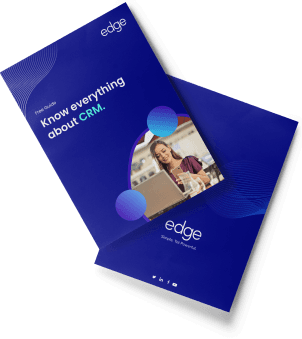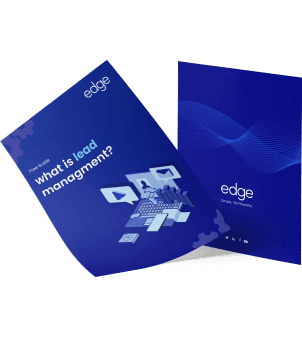Table of Content
1. Introduction
2. What is customer relationship management (CRM) and its importance in a business?
3. What are the common challenges businesses face in managing customer relationships?
4. What are the key features of Edge CRM that enhance CRM?
5. Benefits of using Edge CRM
6. Real-world examples and case studies that demonstrate the effectiveness of Edge CRM
7. How to leverage Edge CRM to maximize CRM effectiveness?
8. How does Edge CRM seamlessly integrate with existing business systems or software?
9. Conclusion
1. Introduction
Maintaining strong and meaningful customer relationships is paramount to success in today's fast-paced and highly competitive business landscape.
Customer Relationship Management (CRM) has become an essential business strategy enabling companies to manage interactions and engage with customers effectively. With the advent of technology, CRM systems and strategies have evolved significantly, and one such advancement is the emergence of Edge CRM.
In this blog post, we will explore how Edge CRM enhances customer relationship management, delving into its features, benefits, and impact on businesses.
2. What is customer relationship management (CRM) and its importance in a business?
Customer Relationship Management (CRM) is a business strategy that builds and maintains strong customer relationships.
CRM plays a crucial role in modern business operations, as it enables companies to understand their customers' needs better, personalize marketing efforts, and provide exceptional customer support.
One solution that enhances CRM processes and outcomes is Edge CRM. Edge CRM is a cutting-edge technology offering advanced features and functionalities, allowing businesses to optimize customer relationship management practices.
It provides a comprehensive suite of CRM tools, software solutions, and platforms that streamline communication, automate workflows, and integrate with other business systems.
With Edge CRM, companies can gather and analyze customer data in real-time, enabling them to make informed decisions, deliver personalized experiences, and build long-lasting customer relationships.
However, implementing and managing CRM systems can present challenges. Some common obstacles include data management, integration issues, employee adoption, and aligning CRM strategies with business objectives. Overcoming these challenges requires proper planning, training, and ongoing evaluation to ensure the CRM system delivers its intended benefits.
3. What are common challenges businesses face in managing customer relationships?
Challenges in managing customer relationships can be significant hurdles for businesses. While CRM systems play a crucial role in addressing these challenges, it's essential to highlight the need for an effective CRM strategy like Edge CRM.
With its advanced features and capabilities, Edge CRM can empower businesses to overcome these obstacles and foster stronger customer relationships. Let's explore some common challenges and key features of Edge CRM.
Common challenges in managing customer relationships
Data Management
Managing huge amounts of customer data can be overwhelming. Edge CRM offers robust data management features. This CRM implementation allows businesses to centralize and organize customer information effectively. It ensures data accuracy, enables segmentation for targeted marketing, and provides real-time insights for better decision-making.
Integration Issues
Integrating CRM systems with other business applications can be complex. Edge CRM offers seamless integration capabilities, enabling businesses to connect their CRM with marketing automation, email marketing, and e-commerce platforms. This integration ensures a unified view of customer interactions and eliminates data silos.
Employee Adoption
Encouraging employees to embrace and utilize the CRM system can be challenging. Edge CRM provides a user-friendly interface and comprehensive training resources to facilitate smooth adoption. Its intuitive design and ease of use make it easier for employees to navigate and leverage the system's full potential.
Customization and Scalability
Every business needs unique CRM software solutions. Edge CRM offers customization options, allowing businesses to tailor the system to their needs. It also provides scalability, accommodating the growth and evolving needs of the business without compromising performance.
Customer Engagement
Engaging customers effectively requires personalized experiences. Edge CRM analytics your businesses with their inbuilt CRM tools for targeted marketing campaigns, automation, and customer segmentation. It enables businesses to deliver personalized interactions, improve customer satisfaction, and foster long-term loyalty.
4. What are the key features of Edge CRM that enhance CRM?
Edge CRM offers a range of features that play a crucial role in enhancing customer relationship management (CRM) for businesses.
Edge CRM provides robust contact management capabilities, allowing businesses to organize and store customer information efficiently.
It enables businesses to maintain a comprehensive contacts database, including their demographics, preferences, and communication history. This feature ensures accurate and up-to-date customer data, enabling personalized interactions and targeted marketing efforts.
Let's explore some key features and the benefits they bring:
Communication Tracking
Edge CRM enables businesses to track and manage all customer communication channels, including emails, phone calls, and social media interactions. This feature ensures that no customer communication goes unnoticed or unaddressed. It helps businesses maintain a consistent and timely response to customer inquiries, improving customer satisfaction and stronger relationships.
Customer Interaction History
With Edge CRM, businesses can easily access a complete history of customer interactions and engagements. This feature provides valuable insights into past purchases, preferences, and support tickets. By understanding the customer journey and interaction patterns, businesses can personalize their approach, tailor offers, and provide a more personalized and seamless customer experience.
Task and Activity Management
Edge CRM offers task and activity management capabilities, allowing businesses to track and assign tasks related to customer interactions. This feature ensures that follow-up actions are not missed, and tasks are prioritized based on importance. It streamlines workflow and helps teams stay organized, ensuring efficient customer management.
Edge CRM offers businesses the ability to provide a personalized and seamless customer experience by utilizing features such as contact management and customer interaction history.
This customization results in increased customer satisfaction, loyalty, and retention.
Edge CRM saves time for employees through its streamlined CRM processes and automated functions like data entry and communication tracking.
CRM platform allows them to concentrate on fostering relationships and offering proactive support, leading to improved efficiency and the capacity to manage a larger customer base.
With its advanced analytics and reporting capabilities, Edge CRM empowers businesses to gain valuable insights into customer behaviour and trends.
5. Benefits of using Edge CRM
Edge CRM brings many specific benefits to customer relationship management (CRM), revolutionizing how businesses engage with their customers. From improved customer engagement to enhanced personalization and streamlined communication, the advantages of Edge CRM are evident.
Let's explore some specific benefits and use cases of Edge CRM.
Improved Customer Engagement:
Edge CRM empowers businesses to engage with customers more meaningfully and personally. Businesses can understand customer preferences, behaviours, and needs by leveraging advanced analytics and customer insights. This knowledge allows targeted marketing campaigns, personalized recommendations, and proactive customer support, leading to higher customer satisfaction and loyalty.
Enhanced Personalization:
Edge CRM enables businesses to deliver personalized experiences throughout the customer journey. By leveraging customer data, businesses can tailor their offerings, messages, and interactions to each customer's specific needs and preferences. This level of personalization enhances the customer experience, builds trust, and increases the likelihood of repeat purchases and long-term relationships.
Streamlined Communication:
Edge CRM facilitates seamless communication across different channels and touchpoints. It centralizes customer data, interactions, and communication history, enabling a unified and consistent experience. With Edge CRM, businesses can provide timely responses, track customer inquiries, and ensure efficient team collaboration, resulting in improved customer satisfaction and faster issue resolution.
Real-World Use Cases:
E-commerce:
An online retailer can use Edge CRM to track customer behavior, preferences, and purchase history. With this information, they can send personalized product recommendations, targeted promotions, and tailored offers, increasing conversion rates and customer loyalty.
Service-based Industry:
A service-based business can leverage Edge CRM to streamline customer service processes. By integrating the CRM system with ticketing and support tools, they can efficiently manage customer inquiries, track issue resolution, and provide timely updates, resulting in enhanced customer satisfaction and retention.
Sales Enablement:
Edge CRM equips sales teams with the tools to manage leads and close deals effectively. By providing a centralized platform for lead tracking, pipeline management, and communication, Edge CRM enables sales representatives to stay organized, collaborate efficiently, and deliver a personalized sales experience, ultimately driving revenue growth.
6. Real-world examples and case studies that demonstrate the effectiveness of Edge CRM
Let's talk about Enviro Technologies, a pharma company established in 2002 in Mumbai. The difficulties facing the industrial sector followed.
With an increase in clients, it was getting more difficult to forecast business and schedule the manufacturing and production cycles accordingly.
In addition, like with any expanding sector, it became critical to comprehend and evaluate lead generation processes, sales tactics, and team administration. It became imperative to evaluate the sales and service teams' performance.
Edge CRM offers complete company visibility. The management of Enviro Technologies received a platform that provided them with a 360-degree, comprehensive perspective of their clients, lead creation, lead acquisition prospects, and the factors that contributed to both successes and failures.
Edge CRM provided a comprehensive picture of inquiries and their worth, the status of ongoing projects, the potential cost of missed opportunities, actionable items, and more through value-based analysis.
It enabled correct forecasting of the approaching business and assisted in concomitantly preparing the production schedules because everything was arranged with a thorough analysis. Enviro Technologies reported a significant increase in production after getting a better view.
The sales and servicing teams are now in sync, and timetables are cleverly and methodically arranged. The sales team at Enviro has routinely met deadlines to edge CRM's effective task management.
This real-world example demonstrates the effectiveness of Edge CRM in enhancing customer relationship management. The successful integration of Edge CRM with existing systems resulted in tangible benefits such as increased customer retention, reduced response time, improved customer satisfaction, and increased sales performance.
These success stories highlight the value of Edge CRM in driving business growth and building strong customer relationships through seamless CRM integration and optimized CRM processes.
7. How to leverage Edge CRM to maximize CRM effectiveness?
Businesses can implement practical tips and best practices to maximize the effectiveness of customer relationship management (CRM) using Edge CRM.
Businesses can optimize their CRM processes by leveraging Edge CRM features and ensuring seamless integration with existing systems.
Let's explore some insights and strategies for utilizing Edge CRM effectively.
Understand Your Business Needs
Before implementing Edge CRM, assess your specific business requirements. Identify key pain points and areas where CRM can add value. This understanding will guide you in customizing Edge CRM to align with your goals and streamline relevant processes.
Utilize Edge CRM features:
Familiarize yourself with the various features and capabilities of Edge CRM.
Take advantage of contact management, lead tracking, sales automation, marketing automation, and customer support.
Tailor these features to match your specific business needs and processes.
Train and engage employees:
Provide comprehensive training on effectively utilizing Edge CRM.
Ensure they understand the system's features, functionalities, and benefits.
Encourage active engagement and participation, as employees proficient in Edge CRM can contribute significantly to its success.
Integrate with Existing Systems:
Integration is crucial for a seamless flow of data and information across your organization.
Connect Edge CRM with existing systems such as marketing automation, email marketing, and ERP Software for small businesses.
This integration allows for a unified view of customer interactions and enables efficient data exchange between systems.
Establish Data Management Practices:
Implement robust data management practices to ensure data accuracy and consistency within Edge CRM.
Regularly update and clean your customer database to maintain the integrity of customer information.
Define data governance policies and assign data entry, verification, and maintenance responsibilities.
Leverage Analytics and Reporting:
Take advantage of Edge CRM's analytics and reporting capabilities to gain valuable insights into customer behavior, sales trends, and marketing campaign effectiveness.
Utilize these insights to make data-driven decisions, improve targeting, and refine your CRM strategies.
Continuously Evaluate and Improve:
Regularly assess the effectiveness of Edge CRM in meeting your business objectives.
Gather user feedback, monitor key performance indicators, and make necessary adjustments.
Continuously evaluate and improve your CRM processes to align with evolving customer expectations and industry trends.
8. How does Edge CRM seamlessly integrate with other existing business systems or software?
One of the standout features of Edge CRM is its seamless integration capabilities. It allows businesses to connect Edge CRM with various systems, such as marketing automation, email marketing, customer support, and ERP platforms.
The integration process is simplified through APIs (Application Programming Interfaces) and pre-built connectors, facilitating smooth data flow and system communication.
Benefits of Seamless Data Synchronization:
Centralized Customer Data:
Integration ensures customer data is consolidated and centralized within Edge CRM. CRM tools data silos and provides a unified view of customer interactions and preferences. Businesses can access a comprehensive profile of each customer, enabling personalized marketing, targeted sales efforts, and improved customer service.
Real-time Data Updates:
With seamless integration, data updates are synchronized in real-time across all integrated systems. Any changes made to customer information, such as contact details or purchase history, are instantly reflected in CRM analytics and other connected platforms. It ensures data accuracy and consistency throughout the organization.
Streamlined Workflows:
Integration enhances workflow efficiency by automating data transfer and eliminating manual data entry tasks. For example, when a new lead is generated in a marketing automation tool, it can be seamlessly transferred to Edge CRM, triggering automated follow-up actions by the sales team. This streamlined workflow minimizes errors, reduces duplication of effort, and improves overall operational efficiency.
Enhanced Collaboration:
Integration fosters collaboration and communication among different departments within the organization. Sales, marketing, and customer support teams can access real-time customer data and collaborate more effectively to provide a seamless and personalized customer experience. It enables teams to work in sync, share information, and deliver cohesive customer interactions.
9. Conclusion
This blog post explored how Edge CRM enhances customer relationship management (CRM) and its importance in business. We discussed various aspects and benefits of Edge CRM, highlighting its role in optimizing CRM processes and outcomes.
Let's recap the key points discussed:
Introduction to CRM:
We provided a brief overview of CRM as a business strategy focusing on building and maintaining strong customer relationships.
Edge CRM as a Solution:
We introduced Edge CRM as a cutting-edge technology that enhances CRM tools and practices. It offers advanced features like CRM tools and platforms to streamline communication, automate workflows, and integrate with other business systems.
Challenges in CRM:
We acknowledged the challenges businesses face in managing customer relationships, such as data management, integration issues, employee adoption, and aligning CRM strategies with business objectives.
Specific Benefits of Edge CRM:
We detailed the benefits that Edge CRM brings to CRM, including improved customer engagement, enhanced personalization, streamlined communication, and advanced analytics. These benefits enable businesses to deliver exceptional customer experiences and foster long-lasting relationships.
Real-World Use Cases:
We provided examples of how Edge CRM can be applied in different industries, such as e-commerce, service-based businesses, and sales enablement, to drive results and achieve business objectives.
Practical Tips for Leveraging Edge CRM:
We shared practical tips and best practices for maximizing the effectiveness of Edge CRM, including understanding business needs, utilizing Edge CRM features, training employees, integrating with existing systems, establishing data management practices, leveraging analytics, and continuously evaluating and improving CRM processes.
Overall, Edge CRM is a powerful solution that enhances customer relationship management and drives business growth.
Edge CRM empowers organizations to make data-driven decisions, streamline workflows, and stay ahead in today's competitive market, ultimately improving customer satisfaction, loyalty, and business success.












